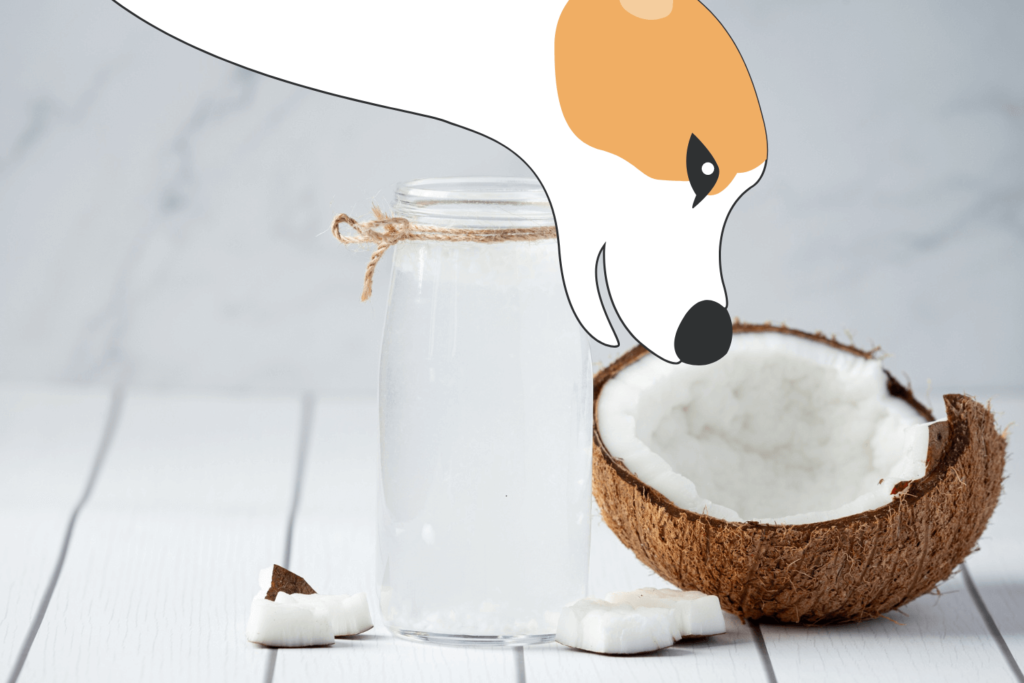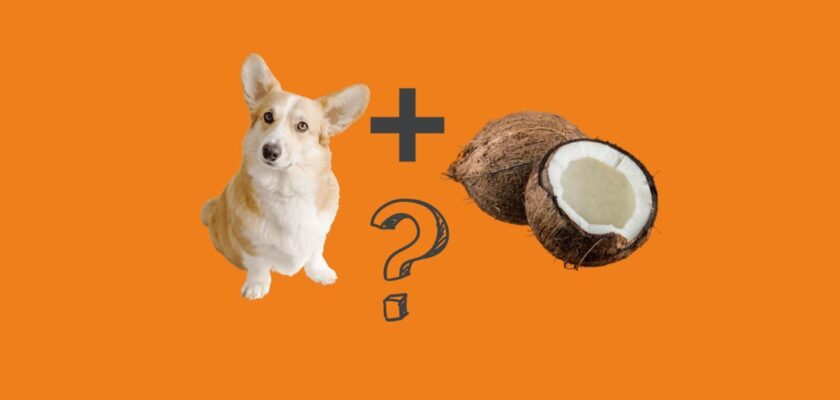I was busy in the kitchen, perfecting my daughter Zoey’s birthday cake. As I hummed along to the radio, I grabbed a bag of shredded coconut and began sprinkling it over the top of the cake. Suddenly, out of nowhere came Bobby – my dog! He raced into the kitchen, leaped and knocked the bag out of my hands, only to start gorging on the coconut. Alarmed, I wondered: can dogs eat coconut? Here’s what I learned that day!
KEY TAKEAWAYS
- Coconut is a healthy and nutritious snack that can be enjoyed by humans and dogs alike.
- Dogs can enjoy the flesh of the coconut, as well as the milk, water, and flakes. All these forms of coconut provide benefits such as hydration, fiber, calcium, potassium, and healthy fats.
- Watch out for potential side effects such as digestive issues and allergic reactions, especially if your dog has any food allergies.
- Talk to your vet before feeding your dog coconut, and always feed them in moderation.
Health Benefits of Coconut for Dogs
Can dogs eat coconut? The short answer is yes. Some of the health advantages of feeding coconut to dogs include:
- improved digestion;
- increased energy;
- better skin and coat condition;
- enhanced cognitive function.
Coconut is a natural source of fiber, vitamins, minerals, and antioxidants, all of which are important for keeping dogs healthy. It can also boost their energy levels by increasing metabolism, allowing them to burn more calories per day than normal while resting. In addition, coconut contains a medium-chain fatty acid called lauric acid, which has antimicrobial properties.
Uses of Coconut Oil for Dogs
Coconut oil is rich in healthy fats that can help with weight loss or maintenance if used properly (by adding it into their diet as opposed to giving them large amounts all at once). You may try adding a teaspoon or two to your pet’s dog food once a week or using it in cooking. It can be used topically as well by applying it directly onto the skin for soothing relief from itching, dryness and flaking.
Meaty Facts About Coconut Meat
Can dogs eat coconut meat? You bet! The white flesh inside a coconut can be eaten raw or cooked, but it’s important to note that it contains less fat than other coconut products. If you are looking for something high in healthy fats for your pet, try those instead. Coconut meat can also be given as an occasional treat or snack for dogs who enjoy chewing on things like bones and antlers.
Is Coconut Milk Good for Dogs?
Yes, as long as it’s sugar-free! Coconut milk is rich in MCTs (medium-chain triglycerides), which are healthy fats that help control body weight. It’s a great source of calcium and potassium, too! You can find unsweetened varieties at most grocery stores near the other non-dairy milks like soy or almond, but make sure to check the label for added sugars before purchasing.
Coconut milk can be used as a replacement for regular dairy in most recipes, or it can simply be mixed with water and served on its own. It is important to note that dogs can only drink it in small amounts, as it’s high in calories. A little bit goes a long way!
Can You Give Your Dog Coconut Water?

Coconut water is a good source of potassium and electrolytes. It can also help with hydration if you’re unable to provide your canine companion quality drinking water for extended periods of time due to travel or outdoor activities like hiking in the summer.
Note: Like coconut milk, coconut water should only be given to dogs in small quantities, as it is high in sugar and calories. Look for unsweetened varieties without added preservatives or flavors.
Can Dogs Eat Coconut Flakes?
Coconut flakes are a great way to add some healthy fiber into your dog’s diet. They can be sprinkled on top of food as a crunchy topping, or mixed in with their regular kibble. Be sure to choose unsweetened, unsalted flakes free from additives and preservatives.
Is Coconut Shell Safe for Dogs?
Some people wonder if the hard outer shell of a coconut can be used as a chew toy for dogs. It is durable and non-toxic, but many experts warn against it. Your dog could choke on pieces of the shell or swallow them, which could lead to an intestinal blockage. It’s best to stick to traditional chew toys!
The soft inner part of the coconut can be used as a chew toy. It’s less durable than its outer shell but still non-toxic and completely safe. It also helps clean the teeth while being chewed on by dogs.
Precautions to Take When Feeding Your Dog Coconut

While coconut does contain a lot of essential nutrients, it is important to use caution when feeding them coconut products. The main risk associated with giving coconut to dogs are digestive issues such as diarrhea or constipation, but there is more…
- Coconut can cause an allergic reaction in some dogs, which may lead to vomiting and other symptoms such as itchy skin and rashes.
- Coconut meat is a good source of fiber, but it can be difficult for some dogs to digest, so it’s important not feed them too much at once! Make sure that you are monitoring your dog’s reaction to coconut products before feeding them large amounts.
- When choosing a product from the grocery store or pet supply store, look for one that says “made with organic coconuts” on the label, as these will be free of pesticides and other chemicals often used during cultivation.
Can Dogs Eat Coconut? Summary
In conclusion, can dogs eat coconut? Yes! Just be sure to consult a veterinarian in case of any food allergies. And as usually with giving pups human foods, don’t overdo it! They’ll thank you for a teaspoon of coconut oil per week, no more than that.
Similar Posts:
- Can Dogs Eat Kiwi Safely? The Truth About Kiwis and Dogs
- Can Dogs Eat Cashew Nuts? Benefits & Downsides
- Can Dogs Eat Squash? Is Butternut Squash Safe for Dogs?
- Can Dogs Eat Whipped Cream? Is Starbucks Puppuccino Bad for Dogs?
- Can Dogs Eat Bananas? Read Before Giving Your Puppy Banana Bread
- Can Dogs Eat Tofu? Are Soy Products Like Cooked Tofu Safe for Dogs?
- Do Cats Drink Milk? Do Cats Like Milk? The Truth About Whether You Can Give Your Cat Milk or Not
- What Fruits Can Cats Eat? These Human Foods Are Safe for Cats

